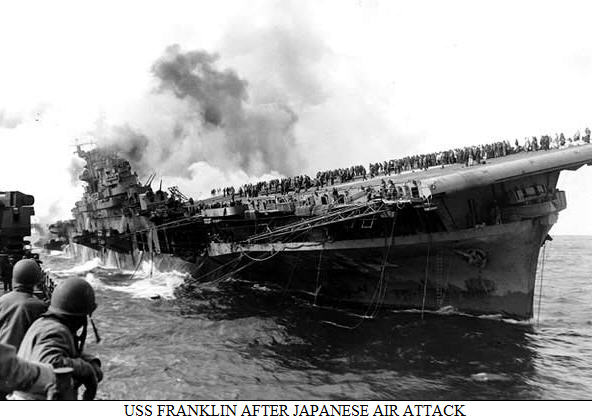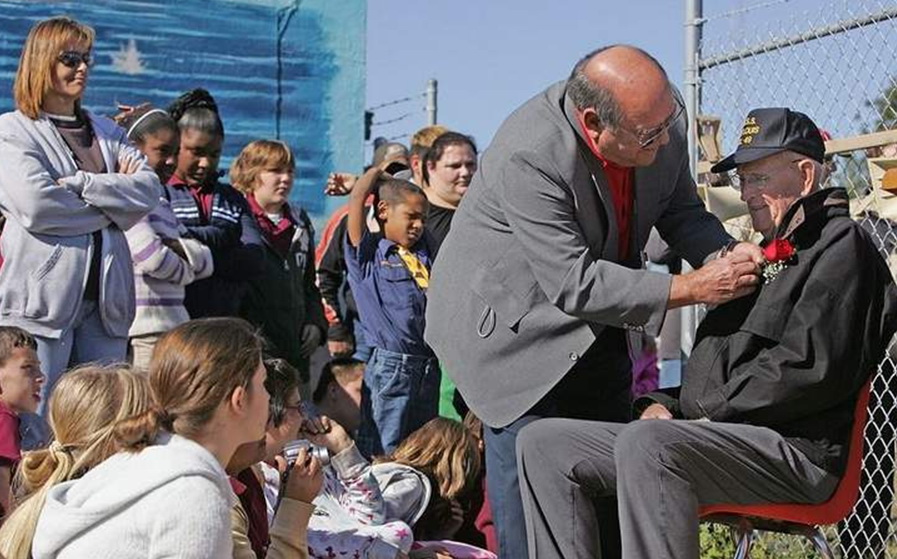

Members of the Crew speak
Last changed 11/25/2016
Home Combat Action RibbonWm. Goode (Aboard) 1941 - 1942 - 1943 - 1944.
Dear Jack,
Recently I sent you a letter with my comments on the Navy Unit Citation we were awarded. Enclosed with this letter are some notes which may or many not be suitable for the Hubble Bubble. You are free to use or discard as you see fit.
Pride:
When we returned to Tulagi after Kula Gulf we stood by to take on survivors from the HELENA who had been rescued by RADFORD and NICHOLAS. Joined by O'BANNON and JENKINS, the destroyers passed close aboard our port side in column and as each ship passed we gave a cheer. This was one of the most impressive moments of the War for me because these four "tin cans" had established themselves as first class warriors and to be honored with and by them like this was indeed an touching honor.
Dinner
Un-like the crew who ate what the Supply Officer provided for the general mess, the Caterer of the Wardroom Mess adopted a menu based on the wishes [and pocketbooks] of the officers. A list was circulated and each officer could write in his choices. One day I found that the menu had changed radically with rice and curry being served every other day. It seemed that several of the senior officers who liked rice and curry had hi-jacked the list being circulated and changed it like a Chicago election. Those of us not fond of rice and curry endured it until the next menu was approved on which this dish naturally did no
Coffee
One night while we were operating off
Guam, the messenger woke me up and told me to report to the XO. I was
told that I would be a courier to take some classified material to the
flagship by whale-boat. The seas were rough and stormy.
I prepared by drinking cup after cup of black coffee in the wardroom
until 1 was thoroughly wide awake.
At that point the messenger came in and informed me that the trip had
been cancelled. I was relieved and went back to my stateroom to resume
my sleeping but I found that I had so much caffeine in my system that it
was several days before I could close my eyes and sleep.
Chills:
Whenever air attack was threatening the bugler would sound "Air Defense" and all hell would break loose. This call starts with two series of two slow high pitched notes followed by an overpowering tune. Once you have heard it in action you can never forget it. To this day, wherever I am and I hear two high pitched notes in succession I freeze until I realize that I do not have to man my battle station.
H-B Editor Jack: Notes! In the old cavalry, the bugler played this sound, it was called "Boots and Saddles" I can truly testify it does bring you to your feet.
Orders:
In December 1942 we arrived in Noumea. Another cruiser moored alongside to port. The marine sentry on the bow had orders to challenge any boat approaching and to fire if he had no response. A boat did approach and crossed close aboard from starboard to port. The sentry challenged and when the boat ignored the challenge he fired his weapon across the boat's bow.
The boat continued and went alongside the other ship. In a few minutes a four striper stormed aboard our ship, went forward, seized the sentry's weapon, threw it over the side and stormed back to the other ship. Our captain took immediate action being longer in rank, ordered the other cruiser to get underway immediately and find some other berth. The sentry assignments and instructions were changed at once.
Hated Chore:
The most hated chore faced by officers during the war was assignment to the "censor board". All personal mail leaving the ship had to be reviewed and passed by the board. Just before mail was scheduled to leave the ship, the mail clerk would bring bags of mail to the wardroom and stack the contents on the tables. The officers were required to read each letter, make necessary deletions, stamp the envelope with the censor stamp and initial the seal. It was the rule that the contents of any letter were never discussed with anyone. Because sailors often poured out their hearts in their letters it was imperative that neither the contents nor the identity of the individual censor be revealed. We had enough to worry about without getting involved in the feelings of the crew.
I personally know of no instance where an officer discussed a censored letter with the writer. Likewise I know of no officer who faced his censoring duty with anything but a strong distaste. Shipboard life in wartime is too demanding to permit otherwise.
Hole"-y Departure:
The Hubble Bubble" has contained many
first hand accounts of December 7, 1941, but I do not recall any mention
of the frantic but successful efforts by the ship fitters to cover the
four foot hole cut in the ship's side to facilitate boiler repairs as
the bombs started to fall. The patch was welded in place and the ship
entered the channel with the weld still hot. A Case of Diarrhea:
During the Guam operations I received my
orders to report to the nearest US port for reassignment. Because of
threatening weather we retired to Kwajalein to regroup. I thought this
would be an excellent time to leave the war zone and so I approached the
captain with the suggestion that he detach me. His response was firm and
unequivocal , "I want you to stay on board until we secure Guam". I was
disappointed but not upset. We returned to the Guam-Saipan area and resumed operations. One day
operations ceased and the ship began to increase speed and move west.
The Captain then came on the squawk box. His words made my heart miss a
beat. "This is the Captain speaking. We are heading west at best speed
to meet the main Japanese battle fleet". To me it was too much like the
movies. The hero gets his orders to the rear but before he can leave he
is ordered on one more mission, one on which he gets shot down. It was
then that I developed a case of diarrhea and a conviction that my days were numbered.
Be Aware of your Words:
Another seasoning thing when growing into an "Officer Of the Day". The
following is a very good lesson taught me quickly to never use the word
"right" except to indicate a direction.
I was during a break in the South Pacific campaign when we were
under the OTC of a Hollywood Admiral who insisted that we maneuver at 600 yard intervals instead of the wartime 1000 yards.
We were in a line abreast when the signal came in ordering a simultaneous turn to the left to form a column. When the signal was executed I ordered "Left Standard Rudder". The helmsman answered with "Did you say left standard rudder, Sir ? "My reply. "That's right".
And I watched in horror as our bow rapidly swung to starboard while the
ship on our starboard side was coming left towards us. I corrected the
error in time to avoid a collision, but I learned never to say "right"
unless I meant a direction. Take a strain.
A Parting Remark:
You must remember that history is not an assembly of facts. It is a collection of personal recollections and impressions. Two men experiencing the same event will recall it differently. This is complicated by the fact that the computers of our minds do not have filters which allow only facts to be recorded You have shown remarkable patience in listening to everyone and not getting upset by the inconsistencies
Keep a strain, Bill Goode
From --- James Womack,
310 Waverly Rd.
Thibodaux, LA 70301-7152
Hi Jack,
I just finished reading your last issue of the H-B, thought it was one of the better ones.
I can add a little to Joseph Ferrarar’s description of holy stoning the wooden decks. He failed to mention that "Sand" was spread over the whole deck after being wet down. Then the holy stone was manned with a sailor using a "squee-gee" handle. We lined up and would go over each plank 7 times while standing up in a bent over position.
PS..........hand writing was never one of my claims to fame ......
Jim Womack

Jim Womack - 1939 / 1944 of original commissioning crew
Ed'r Jack’s note!
Jim, I also have experience in the holy stoning of the wooden decks. Being so young!!!!! I was still a deck seaman when the war ended. In late August "45" the powers that be, decided we were to remove all paint from the main decks, (hand scrapers) and the holey stoning of same would be a part of the peace time routine.
We lined up as you described, only on our hands and knees across the deck. A fire brick with a small indentation in the top was for every seaman participating. A small piece of a swab handle about 24 inches long was given each. The worker would kneel, place one end in the hole in the top, cross his arms over the handle, laying the other end back on his shoulder, and commence the swinging, sanding motion back and forth.
All the men with bricks swaying and sanding in a rhythm while salt water was flowed across the deck washing away the sand worn from the brick.. In no time at all the decks went from dark painted blue to a bleached white Navy Deck. The Navy stays looking good with the sweat of the topside sailors, I think.